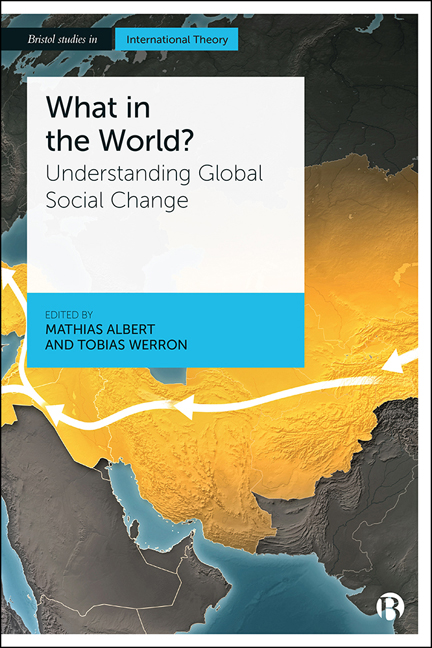Book contents
- Frontmatter
- Contents
- List of Figures and Tables
- Notes on Contributors
- Acknowledgements
- 1 Introduction: World Society and Its Histories – The Sociology and Global History of Global Social Change
- 2 Every Epoch, Time Frame or Date that Is Solid Melts into Air. Does It? The Entanglements of Global History and World Society
- 3 Periodization in Global History: The Productive Power of Comparing
- 4 Communication, Differentiation and the Evolution of World Society
- 5 Field Theory and Global Transformations in the Long Twentieth Century
- 6 Organization(s) of the World
- 7 Particularly Universal Encounters: Ethnographic Explorations into a Laboratory of World Society
- 8 From the First Sino-Roman War (That Never Happened) to Modern International-cum-Imperial Relations: Observing International Politics from an Evolution Theory Perspective
- 9 Nationalism as a Global Institution: A Historical-Sociological View
- 10 States and Markets: A Global Historical Sociology of Capitalist Governance
- 11 The Impact of Communications in Global History
- 12 The ‘Long Twentieth Century’ and the Making of World Trade Law
- 13 Third-Party Actors, Transparency and Global Military Affairs
- 14 Technical Internationalism and Global Social Change: A Critical Look at the Historiography of the United Nations
- References
- Index
13 - Third-Party Actors, Transparency and Global Military Affairs
Published online by Cambridge University Press: 22 December 2021
- Frontmatter
- Contents
- List of Figures and Tables
- Notes on Contributors
- Acknowledgements
- 1 Introduction: World Society and Its Histories – The Sociology and Global History of Global Social Change
- 2 Every Epoch, Time Frame or Date that Is Solid Melts into Air. Does It? The Entanglements of Global History and World Society
- 3 Periodization in Global History: The Productive Power of Comparing
- 4 Communication, Differentiation and the Evolution of World Society
- 5 Field Theory and Global Transformations in the Long Twentieth Century
- 6 Organization(s) of the World
- 7 Particularly Universal Encounters: Ethnographic Explorations into a Laboratory of World Society
- 8 From the First Sino-Roman War (That Never Happened) to Modern International-cum-Imperial Relations: Observing International Politics from an Evolution Theory Perspective
- 9 Nationalism as a Global Institution: A Historical-Sociological View
- 10 States and Markets: A Global Historical Sociology of Capitalist Governance
- 11 The Impact of Communications in Global History
- 12 The ‘Long Twentieth Century’ and the Making of World Trade Law
- 13 Third-Party Actors, Transparency and Global Military Affairs
- 14 Technical Internationalism and Global Social Change: A Critical Look at the Historiography of the United Nations
- References
- Index
Summary
Introduction
This chapter explores the limits of a process of global social change that can be labelled the institutionalization of world society. Since the second half of the nineteenth century, transnational and international organizations have collected, produced and published comparative data on a variety of aspects of world politics (see Ward, 2004; Speich Chassé, 2016; and Daniel Speich Chassé, Chapter 14 in this volume). This process has created a complex global system of ongoing quantified observation and evaluation of patterns, trends and problems in world politics and also in other parts of world society. In this system, transnational and international organizations mostly act as third parties that track and assess the competition among states over goods such as security, wealth, prestige and legitimacy. They stand outside the competition, but, by reporting on how states fare in it, they nevertheless – at least potentially – influence how the competition is perceived and hence how it plays out (see Werron, 2012b, 2015a).
The chapter traces the emergence and effects of such third-party actors in the field of global military affairs. It makes two arguments, one about the scope and one about the impact of the institutionalization of world society. First, global military affairs are no exception to the rise of third-party actors over the last century and a half. The literature on security politics generally focuses on the practices and institutions through which states assess the military competition in world politics. It neglects the third-party actors that likewise produce data on the patterns of expenditures, capabilities and trade in global military affairs. The group of third-party actors notably includes the United Nations (UN), the International Institute for Strategic Studies (IISS) and Stockholm International Peace Research Institute (SIPRI). Second, while the emergence of this group of third-party actors has fundamentally changed the system of observation and comparison in global military affairs, it has (so far) not changed the underlying dynamics of military competition. Global military affairs thus show that, as the introduction to this volume highlights, it is important to think about both change and continuity in narratives of global social change (see Albert and Werron in their introduction to this volume).
The chapter is structured in the following way. The next section discusses the potential effects of third-party actors on competitive dynamics in world politics.
- Type
- Chapter
- Information
- What in the World?Understanding Global Social Change, pp. 227 - 242Publisher: Bristol University PressPrint publication year: 2020

